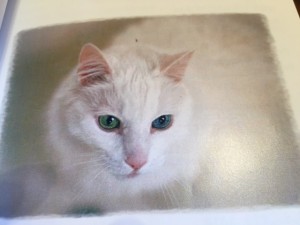 We lost a beloved neighborhood cat last week. The Smurf was a beautiful Maine coon cat of just fifteen years. She had recently been diagnosed with advanced bone cancer. While she was an indoor cat for most of her life, when rescued dogs began joining the household, she began joining them out of doors for part of the day. In fact, she accepted the dogs without issue—often curling up and sleeping in the dog pile on the family bed.
We lost a beloved neighborhood cat last week. The Smurf was a beautiful Maine coon cat of just fifteen years. She had recently been diagnosed with advanced bone cancer. While she was an indoor cat for most of her life, when rescued dogs began joining the household, she began joining them out of doors for part of the day. In fact, she accepted the dogs without issue—often curling up and sleeping in the dog pile on the family bed.
The Smurf didn’t venture far, but she had her roaming routine, always returning home  where her heart was. She was a familiar part of our neighborhood, often seen sitting at the edge of her driveway watching people walk past with or without an accompanying dog. I often stopped to photograph this rather regal cat.
where her heart was. She was a familiar part of our neighborhood, often seen sitting at the edge of her driveway watching people walk past with or without an accompanying dog. I often stopped to photograph this rather regal cat.
When she began looking a little scruffy around the edges and walking away from her food dish without eating, her humans took her to the veterinarian and that’s when they got the awful diagnosis. Two days later, she was gone.

Don’t Leave Me Behind
We had a wonderful cat we called Winfield. He was a white odd-eye cat. When he was fourteen, we noticed he was rejecting food and treats, we took him to his veterinarian and learned that he had a cancer in his throat. Winfield was an indoor-only cat, so only visitors got to know him and most of them simply adored him for his friendly demeanor and sweet disposition. He loved people and petting and just being admired.
Many of you reading this have had something similar occur with your own beloved cats. When we get a dire diagnosis for our cat like this, it usually comes as a shock. We wonder, How could the disease have become so serious without us knowing about it? Could we have thwarted it if we’d known about it earlier? Why wasn’t I paying closer  attention?
attention?
Does this sound familiar to you? If you’ve ever known a pet to suffer, certainly you’ve pondered these questions. But could The Smurf’s or Winfield’s cancer have been prevented—probably not. If we’d discovered the cancer earlier, would there have been a cure? Most likely not. However, there certainly are steps we can take to prevent suffering in our cats. First, we must  understand that cats are extremely skilled at hiding their pain. Experts say that this is part of their survival mechanism. So we mustn’t beat ourselves up for not noticing something was wrong when the cat is doing her best to mask an ailment or injury. With this in mind, if you notice any changes in your cat’s routine, demeanor, habits, etc., it’s time to start being super focused on the cat. Check him for obvious lumps, sore spots, changes in eating, sleeping, and litter box habits. If you notice anything out of the ordinary, it’s probably time for a professional opinion and don’t be surprised if you learn your cat has been suffering for a while. She just didn’t want you to know. But there are subtle and sometimes blatant signs that your cat is in trouble and needs professional help. This site spells them out succinctly for you. Please spend some time here and note the highlights. You never know when you’ll need this information. https://www.preventivevet.com/cats/how-can-i-tell-if-my-cat-is-in-pain
understand that cats are extremely skilled at hiding their pain. Experts say that this is part of their survival mechanism. So we mustn’t beat ourselves up for not noticing something was wrong when the cat is doing her best to mask an ailment or injury. With this in mind, if you notice any changes in your cat’s routine, demeanor, habits, etc., it’s time to start being super focused on the cat. Check him for obvious lumps, sore spots, changes in eating, sleeping, and litter box habits. If you notice anything out of the ordinary, it’s probably time for a professional opinion and don’t be surprised if you learn your cat has been suffering for a while. She just didn’t want you to know. But there are subtle and sometimes blatant signs that your cat is in trouble and needs professional help. This site spells them out succinctly for you. Please spend some time here and note the highlights. You never know when you’ll need this information. https://www.preventivevet.com/cats/how-can-i-tell-if-my-cat-is-in-pain





